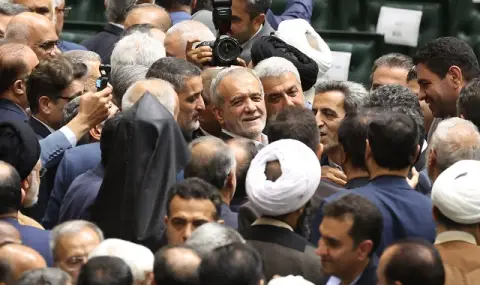Iranian President Massoud Pezeshkian rebuked the West, saying Israel was "carrying out mass murder" in the war in the Gaza Strip and used European and American weapons for this, the Associated Press reported, quoted by BTA.
Pezeshkian, who spoke in Baghdad on his first visit outside the Islamic Republic since taking office, hopes to strengthen Tehran's ties with Baghdad as regional tensions increasingly draw both Shiite-majority countries into the expanding conflict in the Middle East.
Iran is a staunch supporter of the Palestinian armed group "Hamas" after October 7, when its fighters carried out attacks on towns and kibbutzim in southern Israel, which also triggered the war in the Gaza Strip. According to local health officials, more than 40,000 Palestinians have died since the conflict began. The war has also caused massive destruction and displaced some 90 percent of the Palestinian enclave's population of 2.3 million, with some displaced more than once.
"Israel commits mass murder against women, children, young men and the elderly. They are bombing hospitals and schools," Pezeshkian said. "All these crimes are committed with European and American ammunition and bombs," he added, without giving further details.
Last night, an explosion hit a facility near Baghdad International Airport, used by the US military, shortly before Pezeshkian arrived. No casualties have been reported and the circumstances surrounding the blast remain unclear. The US Embassy later described what happened as an "attack" against the diplomatic compound in Baghdad, a US diplomatic facility, and said it was "assessing the damage" and the cause of the explosion.
Iraq Prime Minister Mohammed Shia al-Sudani told reporters during a joint press conference with Pezeshkian that the two neighboring countries signed 14 memorandums of understanding today to strengthen relations. He also pledged that Iraqi airspace would not be used for attacks against the Islamic Republic - an apparent reference to Israel.
Pezeshkian, who was sworn in as Iran's new president in July, will also visit Shiite shrines in Iraq's holy cities of Karbala and Najaf, as well as the railway project to link the southern city of Basra with Iran and Erbil, the capital of the semi-autonomous Iraqi Kurdistan region. .
Despite all this, tensions continue to exist between Iran and Iraq, especially since over the past six years Iranian missiles have repeatedly hit various sites in Iraq - Kurdish militias, a base housing US forces, and sites that Tehran claims they were Israeli.
The United States maintains a force of 2,500 troops in Iraq, which continues to battle the remnants of the once-dominant Islamic State extremist terrorist group in the region. US troops remain a potential target for Iran, especially at a time when the nearly year-long war between Israel and "Hamas" in the Gaza Strip continues, notes Reuters.
Iran fired missiles and used drones that flew over Iraq during the unprecedented direct attack on Israel in April. The attack followed a suspected Israeli strike on an Iranian diplomatic compound in Damascus, Syria, which killed two Iranian generals and five senior military personnel, as well as a member of the Lebanese Shiite movement Hezbollah, a close ally of Iran.
For its part, Iraq also needs close ties with the Islamic Republic to maintain supplies of Iranian natural gas, which Baghdad imports to meet its electricity needs. Supplies have continued under a swap deal in which Iran receives Iraqi crude oil in exchange for natural gas, although US sanctions against Tehran over the country's continued development of its nuclear program put pressure on Baghdad.
The continued presence of US troops in Iraq continues to cause concern in Iran. After the outbreak of war between Israel and "Hamas" Iraqi militias, which are close allies of the Islamic Republic, directed their attacks at American forces on the ground, which also led to American airstrikes against them. Iraqi politicians continue to debate the question of whether to support the stay of American troops in the country, notes Reuters.
